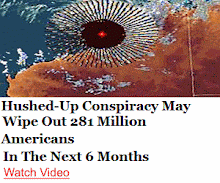In 1959, US President Dwight D. Eisenhower sought to reduce America’s atomic firepower by as much as 50% on the grounds that its stock alone was enough to wipe-out the entire human species and then some.
Eisenhower was aware of US plans to kill millions of civilians in Russia in the event of a nuclear war. Documents revealed recently by the U.S. National Archives and Records Administration confirms the “systematic destruction” of major cities, including 179 in Moscow, 145 in Leningrad and 91 in East Berlin. The targets are referred to as DGZs or “Designated Ground Zeros.” While many are industrial facilities, government buildings and the like, one for each city is simply designated “Population.” In other words, America had atomic weapons targeted on mass population areas to kill as many civilians as possible in the event of a conflict with Russia.
Matthew G. McKinzie, the director of the nuclear program at the Natural Resources Defense Council also confirmed “The heart of deterrence is the threat to destroy the adversary’s cities, even today.”
Matters have not got better at all. In fact, the Cold War may have been a very tense time but the situation is now much worse; or in the words of Richard Falk, American professor emeritus of international law at Princeton University, “Not since the dawn of the nuclear age at the end of World War II has the danger of nuclear war been greater.” Falk said just ten years after the end of the Cold War.
The Guardian quotes former US defence Secretary William Perry – “The risks of a nuclear catastrophe – in a regional war, terrorist attack, by accident or miscalculation – is greater than it was during the cold war and rising.” Perry, who served at the Pentagon from 1994 to 1997, made his comments a few hours before North Korea’s nuclear test last week, and listed Pyongyang’s aggressive atomic weapons programme as one of the global risk factors.
 Perry continues – “Progress made after the fall of the Soviet Union to reduce the chance of a nuclear exchange between the US and Russia is now unravelling. The probability of a nuclear calamity is higher today, I believe, that it was during the cold war. A new danger has been rising in the past three years and that is the possibility there might be a nuclear exchange between the United States and Russia.” – just as Falk feared.
Perry continues – “Progress made after the fall of the Soviet Union to reduce the chance of a nuclear exchange between the US and Russia is now unravelling. The probability of a nuclear calamity is higher today, I believe, that it was during the cold war. A new danger has been rising in the past three years and that is the possibility there might be a nuclear exchange between the United States and Russia.” – just as Falk feared.
Twenty new nuclear missiles have been delivered to Germany to add to the growing weapons systems aimed at Moscow by America and its NATO allies. Collectively, these twenty weapons could take out the equivalent of eighty Hiroshimas or 12 million civilians.
The Russian Foreign Ministry has repeatedly warned the U.S. against stationing its nuclear weapons in Europe, aimed at Russia to avoid “dangerous consequences.”
The increased nuclear weapons stationed in Germany increases the stock targeting Russia to 200 that are based across Europe, currently deployed in Belgium, Italy, the Netherlands, Germany and Turkey, enough to wipe out tens of millions of people.
Russia warns that the increased military operations of NATO, led by the US, is deteriorating the military-political situation in the world.
Twenty years after the Cold War, neither nation has ruled out first use of its nuclear arsenal and both maintain a launch-on-warning, keeping a combined total of 1,800 nuclear weapons on hair-trigger alert that could annihilate the human species.
It is clear that with relations deteriorating all the time between these two super-powers, communication between NATO and Russian chains of command is at a new low – far worse than in the 1970s and ’80s, which makes everything so much more dangerous.
But the constant US/Russia threat is only one of many dangers.
This Book Could Save Your Life (Ad)
The Nuclear Threat Initiative (NTI.org) reports that “nearly 2,000 metric tons of weapons-usable nuclear materials remain spread across hundreds of sites around the globe—some of it poorly secured.” And, “meanwhile, the international community is still not effectively organised to protect the world from catastrophic terrorism.”
NTI sends a clear warning -“This disturbing lack of an effective system for security standards and practices around the world’s most dangerous materials stands in contrast to the strict standards in place in other high-risk global enterprises, such as aviation.”
Director General Yukiya Amano of the International Atomic Energy Agency (IAEA) also made this very worrying statement in July 2013 “Over a hundred incidents of thefts and other unauthorised activities involving nuclear and radioactive material are reported to the IAEA every year.”
Concern rises further when considering America’s and Russia’s role in Ukraine and Crimea. The result – Russia and the United States declined to renew their Cooperative Threat Reduction (CTR) umbrella agreement, which provided a legal foundation for negotiating specific joint projects for eliminating or reducing WMD-related threats.
 Most of Russia’s Soviet-era WMD assets have been eliminated or made more secure over the twenty years of the CTR agreement. In addition, the Russian government has increased its own capacity to control and defend these assets, due in part to a remarkable economic recovery since the late 1990s which is now under threat due to economic sanctions imposed by the West. It doesn’t help that the US has reduced funding to these programmes in Russia.
Most of Russia’s Soviet-era WMD assets have been eliminated or made more secure over the twenty years of the CTR agreement. In addition, the Russian government has increased its own capacity to control and defend these assets, due in part to a remarkable economic recovery since the late 1990s which is now under threat due to economic sanctions imposed by the West. It doesn’t help that the US has reduced funding to these programmes in Russia.
What did the CTR achieve in twenty years of US/Russian co-operation? As the Centre for Strategic and International Studies highlights – “over 7,600 warheads deactivated, over 900 intercontinental ballistic missiles and over 650 submarine launched ballistic missiles destroyed, 24 Russian nuclear sites have undergone security upgrades, and all nuclear weapons have been removed from Ukraine, Kazakhstan, and Belarus. By many accounts, CTR – also called the “Nunn-Lugar” program after its founders Senators Sam Nunn and Dick Lugar – is the most successful nonproliferation program.”
It is bad enough that on average every 4.6 years there is a ‘serious military mistake’ involving nuclear weapons that could trigger an automated, but unintentional State-to-State nuclear exchange. It is made worse with the ever increasing threat of terrorism, especially now that Islamic State militants announced they would obtain a nuclear weapon within the next 12 months, particularly now that illegal weapons dealers are seeking IS buyers for their wares.
As the American administration relentlessly instigates confrontation and conflict around the world in pursuit of global domination in the guise of a ‘war on terror’, it raises the stakes to fever pitch. Instead of trying to initiate peaceful outcomes and reconciliation to collaborate for our own safety, all we have is hatred, alienation, animosity and the constant threat of dark times as the US continues high risk geopolitical ambitions over human existence.
You can read more from Graham Vanbergen at his site truepublica.org.uk


Be the first to comment on "Nuclear War And The Theft of Nuclear and Radioactive Materials"